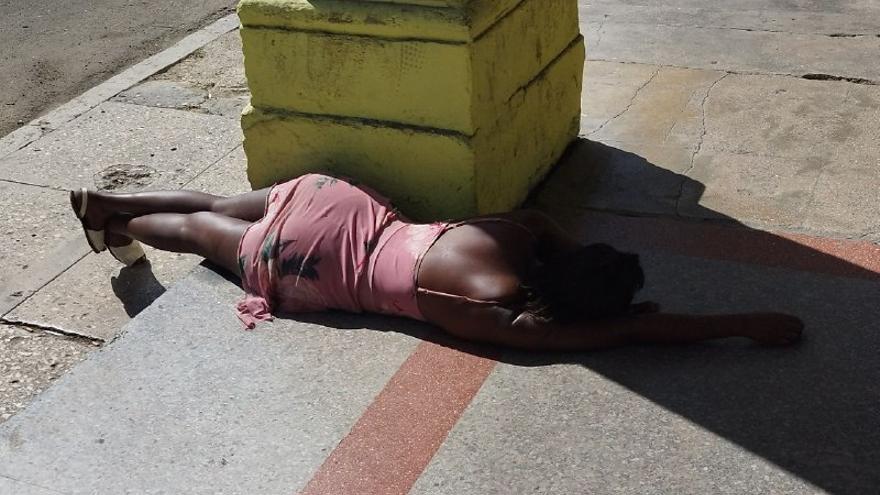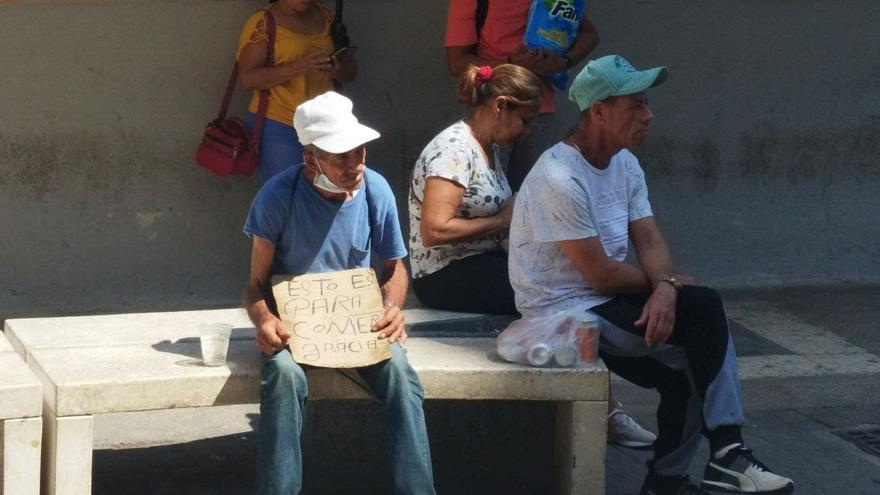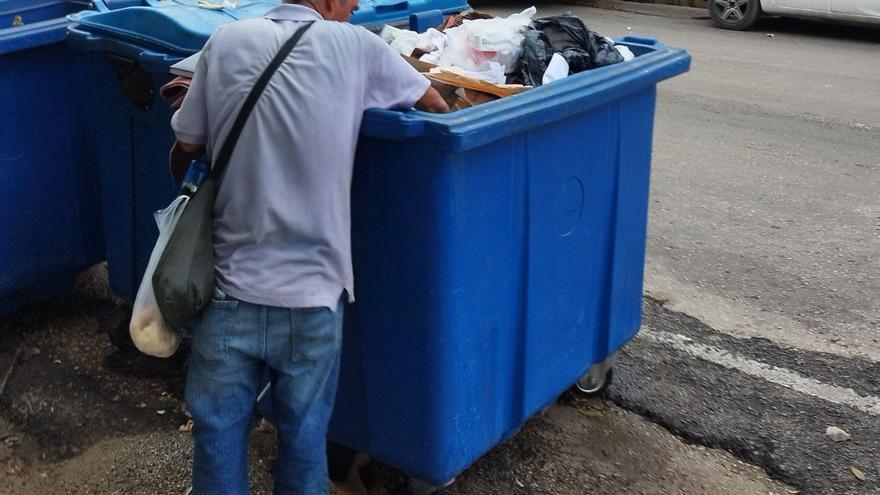
![]() 14ymedio, Juan Diego Rodríguez / Olea Gallardo, Havana, 30 March 2023 — The crisis that Cuba is experiencing is not only reflected in the official data, independent reports and the unstoppable exodus. In the streets, at every step, the poverty is evident. Ana María, a middle-aged neighbor of Central Havana, mentions an example: “A few days ago, on Infanta Street, a man in his 50s was going to pick up some croquettes from the floor, and when he saw that I saw him, he was embarrassed. The truth is that I was more ashamed than he was.”
14ymedio, Juan Diego Rodríguez / Olea Gallardo, Havana, 30 March 2023 — The crisis that Cuba is experiencing is not only reflected in the official data, independent reports and the unstoppable exodus. In the streets, at every step, the poverty is evident. Ana María, a middle-aged neighbor of Central Havana, mentions an example: “A few days ago, on Infanta Street, a man in his 50s was going to pick up some croquettes from the floor, and when he saw that I saw him, he was embarrassed. The truth is that I was more ashamed than he was.”
These scenes are comparable to the previous great crisis, which was at least baptized with one of the greatest euphemisms that Castroism ever came up with: “the special period in time of peace.” It was common then, in the 90s, to see its imprint on the wrinkled and emaciated bodies of Cubans. Thousands of them suffered from diseases like neuropathy, which left them blind and was caused by malnutrition and the abuse of homemade alcohol.
Today’s crisis has no name, but it does have the same face: the increasingly empty cities, especially of young people and those who fall down unconscious from drinking “train-spark” (homemade alcohol), and the elderly (and not so old) who rummage through containers or beg on the street.
And it doesn’t just happen in Havana. Jorge, from Holguín, says he encounters a similar situation every day. “It has increased a lot, but a lot, the number of people on the street who are rummaging through the trash and asking for money. Today I was having a pizza and soft drink in a private place and a 70-year-old man with crutches, who couldn’t even walk, came in begging, and I bought him the same thing I was eating. Yesterday a woman who saw me counting some money on the street approached and said: ’oh, give me something for the peas’. Right after, another woman asked me if I could buy her some cassava fries. I wanted to give her 100 pesos but she asked me to buy them for her: ’They scammed me,’ she told me crying. And what breaks my heart the most is the children who implore: ’could you give me five pesos?’”
Jorge attributes the scarcity mainly to inflation, which does not let up: “One pound of pork is 400 pesos ($16.70), and you buy four pounds and they are two of meat and two of bone and fat, which doesn’t work. A carton of eggs here is worth 1,500 pesos ($62.50), a liter (33.8 ounces) of cooking oil is 1,300 ($54). People make it to the end of the month almost without oil, without rice.”

Caption – The scenes are comparable to the previous great crisis, which was at least baptized with one of the greatest euphemisms that Castroism ever came up with: “The special period in time of peace.” (14ymedio)
Thus, families are reducing the quantities. They eat rice with a little bit of vegetables, they eat only a banana, they get used to not having animal protein. “I have a neighbor who stops having lunch to give it to her son, who is in high school. Many times I see that they eat rice cooked in bean sauce with two tomato slices because they don’t have a main course,” Jorge explains.
Something similar is told by Lisandra, from Sancti Spíritus. “I recently brought a friend a picadillo that I cooked, after lunchtime, and I realized that her boy had been given rice with beans and she had not eaten anything.”
To have something to put in their mouths, people even eat the impossible. “My mother discarded a horrible picadillo that she had boiled in hot water because someone told her that it looked like ham and she wanted to give it to the neighbor’s dogs. The neighbor let it dry because she wanted it for herself.”
Sometimes, as happened to Ana María with the man who picked up the croquettes in Centro Habana, there is shame for both parties. “When I went to say hello to a friend from the university, at lunchtime, her children interrupted her all the time while we talked: ’Mom, I’m hungry’. And I realized that she didn’t want me to see what they were going to eat,” continues Lisandra, who says: “People don’t say it, but they are going hungry.”
From San Antonio de los Baños, Artemisa, the epicenter of the mass protests of July 11, 2021, Caridad recounts: “The famine is widespread. Soon we will not exist, because we’re going to starve, and we won’t have a doctor to help us.”
The woman, in her thirties with a young daughter, lashes out at the Government: “They can’t solve anything, and they want us to keep electing people we don’t even know. Last week the power didn’t go out because there were elections, and now that there are no elections? If only we could eat all the blackouts.”
Caridad’s list is long, from electricity (“without electricity you can’t live”), to water (“we haven’t had it for five days”), food (“milk is a forbidden product and soon we’ll be talking about beans at 200 pesos [$8])” to increasingly precarious health services (“there is no medical assistance because doctors have no medicines and they are not magicians.”) “I can’t really explain how we are still alive,” she concludes.

“My sister and I bought a yogurt that cost us more than 250 pesos [$10] for 1.5 liters [53 oz.], and we had to pay on the informal market. When a state truck comes, it’s a slaughter, with the cost of yogurt close to 100 pesos [$4], or 70, 80, 90 pesos. You don’t have any meat, a chicken thigh, or a piece of pork. There is no onion even if someone can pay for it,” she lets fly and continues with her litany of sorrows.
Rice, she says, is a “hot item.” “Here in this town they are selling a speckled rice, I don’t know where they get it, which contains transparent pebbles. It’s enough to make God weep. Not only do you have to spend two hours removing these particles, but on top of that they can break a tooth, and then where do you find a dentist? Everything is a stack of dominoes, and now the game is over.”
For Caridad, the moment that Cuba is experiencing could be called “minute zero,” because “we have no options at all.”
There is another widespread comment: what is most worrying are the children. “I suffer bitterly because I have a girl under the age of seven and I worry about the day to day. Even the schools don’t function now. The teachers don’t want to work because they are also hungry,” says Caridad.
For Ana María, the situation with the children is “a disaster,” and she recounts the torment of her grandchildren, who not only have to endure an insipid rice with peas every day but all kinds of propaganda in their classes. “My girl has to show something tomorrow, after a week sick with asthma,. One homework was about the tax system, nothing more and nothing less, and another about Fidel’s life as a child until he was a revolutionary leader,” the woman says. “And the boy had to talk about the Zanjón Pact and Martí’s attitude at that time and also about the elections. Tell me something I don’t know!”
Neither propaganda nor servility nor ordinary work frees Cubans from suffering. “A relative of mine, retired military and doctor, that is, with an above-average retirement, has just celebrated his 80th birthday, and between his brothers-in-law and nephews they collected something to celebrate, because he barely has any money,” says Ana María. She gives another example, her own sister, now retired from the state sector, who was “once pretty but now is skin and bones.”
Another neighbor of Ana María, a health worker, went to her house recently to implore her for something to eat, even if it was only chicken skins, because she couldn’t buy anything.”
As if that were not enough, it’s no consolation to have money to spend in stores in freely convertible currency (MLC): “Even those who have people abroad [who send them hard currency] can’t get food, because the stores are empty. Everything has to be paid to the people who steal it from state places, buy it in Havana or I don’t know where and sell it here so that people can live,” protests Caridad, the young woman from San Antonio de los Baños.
All in all, she, like Ana María, Jorge and Lisandra, are part of that 30% of Cuban families that differ from the rest because they receive help from abroad, the most paradoxical inequality created in 64 years of communism. The rest, most of them, have to settle only for what comes through the rationed market, which is not enough to last the month.
Ana María, who has no way to leave the Island, laments: “I’m now depressed when I go out on the street, the poverty, the grime, the miserable people, the starving animals. I want the aliens to take me, because it makes me want to cry.”
Translated by Regina Anavy
____________
COLLABORATE WITH OUR WORK: The 14ymedio team is committed to practicing serious journalism that reflects Cuba’s reality in all its depth. Thank you for joining us on this long journey. We invite you to continue supporting us by becoming a member of 14ymedio now. Together we can continue transforming journalism in Cuba.
